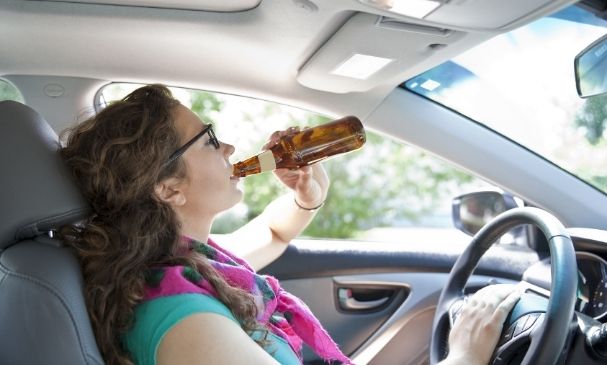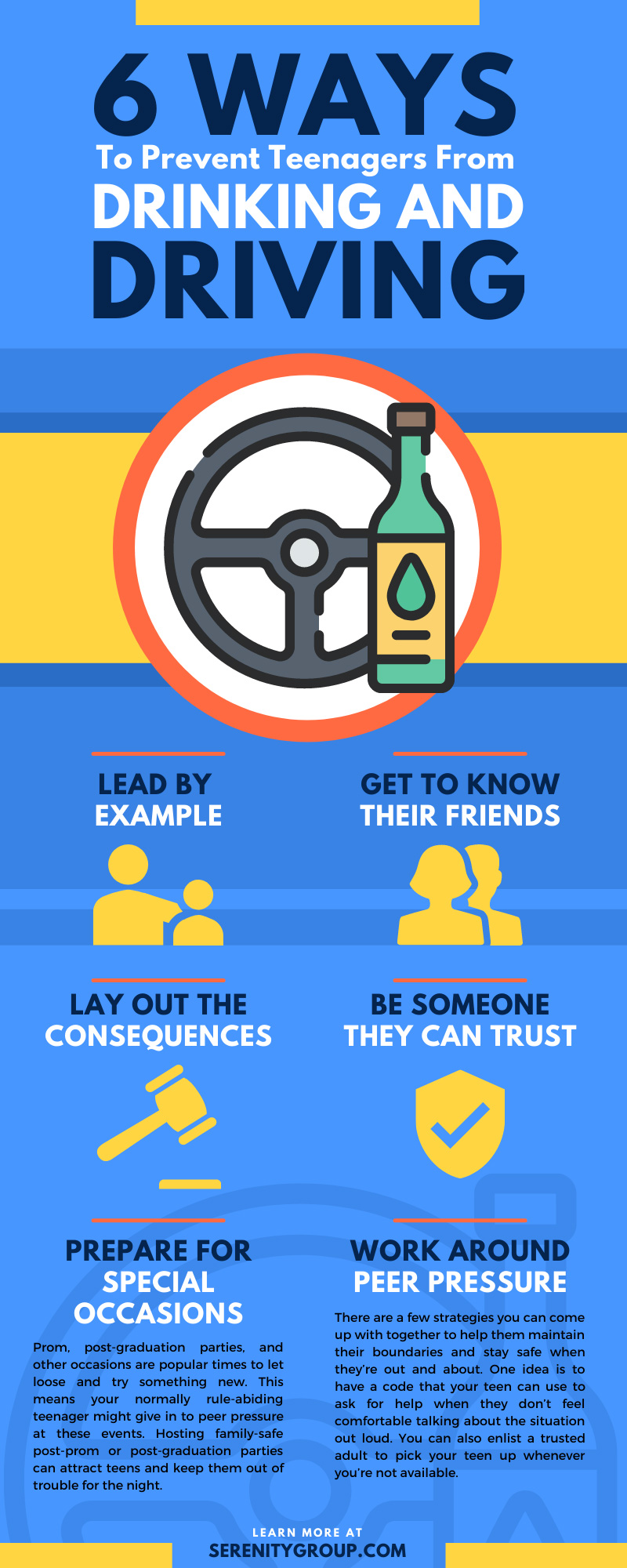6 Ways To Prevent Teenagers From Drinking and Driving

“Say no to drugs. Don’t drink and drive.” Kids grow up hearing crucial safety tips over and over again, but that doesn’t mean they always listen. It’s easy for teenagers to revel in their budding independence, especially once they earn their driver’s license. At the same time, many teenagers feel invincible in their youth. While neither of these qualities is inherently bad, they can lead to reckless behavior that puts your teen and their friends at risk. Teenagers may put themselves in danger by driving while intoxicated or riding with an intoxicated driver. How can parents stress the dangers of drinking and driving without sounding like a broken record? The key is to foster trust and communication so that you can work together to create safe solutions. Learn more with this list of ways to prevent teens from drinking and driving.
Lead by Example
Kids learn a lot of habits and behaviors from their parents. Telling your teenager not to drink is all but meaningless if they’ve grown up watching you consume alcohol on a regular basis—especially if you’ve also broken the law by drinking and driving. If your kids grow up watching you drink responsibly, however, they’ll be more likely to apply those habits to their own life, even if they do experiment with underage drinking. It’s easy to fall into a “do as I say, not as I do” mindset, but this can encourage reckless and dangerous habits in your teenager. Be a strong and responsible role model for them by driving safely and drinking responsibly. This gives your kids a good example to follow as they grow older and start spending more time on the road or in situations where alcohol is present.
Get To Know Their Friends
The more you know about your child’s life, the easier it is to keep track of them and make sure they’re staying out of trouble. Of course, you also want your teenager to exercise their newfound independence. One great way to keep tabs on your kid without being overly controlling is by getting to know the people around them. When you take the time to get to know your teen’s friends, you show that you care about them and want to be involved in their life. This also helps establish more lines of communication with your child when they’re out and about—especially if you know their friends’ parents as well. The more you trust your kid’s friends and their parents, the easier it is to work together to keep everyone out of dangerous situations.
Lay Out the Consequences
Drinking and driving comes with consequences. While your teen might not face jail time for their crime, the repercussions of their actions can linger over the first several years of their adult life. Chances are, your teen has heard that drinking and driving is bad. It’s up to you to make the consequences of their actions explicit in a way that applies realistically to their life. A license suspension means they’ll have to take the bus to school and won’t be able to drive to meet their friends. Court fees or an SR22 car insurance policy will cost money, which means they’ll have less cash to spend on fun things. Depending on where you live, an SR22 requirement will stay on their insurance for a few years. For example, SR22 insurance in Washington generally lasts for three years—or even longer if you miss a payment. This means your teen might graduate high school, buy a new car, or even start their career with an increased insurance premium hanging over them. When your teen understands how consequences like these apply to their life, they’re more likely to take the situation seriously.
Be Someone They Can Trust
The truth is that sometimes teenagers drink. It’s not ideal, but it’s not always preventable. If your teen knows they can trust you to be there for them, even when they break the rules, you can keep an unideal situation from turning into a bad one. Good communication is the key to building trust between you and your kids, making it one of the best ways to prevent teens from drinking and driving. When they come to you with a problem, listen openly without judging or interrupting. This might mean putting off consequences or a lecture until you both find a solution for the situation. For example, if your teenager calls you while drunk and asks for a ride, your priority is to get them home safely. Once they’re sober, you can address the problem of them drinking. Emphasize the fact that your kid can and should always call you when they need help—even if they’ve broken the rules. When your teen knows your priority is to help them, they’ll be more willing to contact you instead of getting behind the wheel or riding with another drunk friend.
Prepare for Special Occasions
Even if your teen acts responsibly on regular occasions, they might face stronger temptations during special events. Prom, post-graduation parties, and other occasions are popular times to let loose and try something new. This means your normally rule-abiding teenager might give in to peer pressure at these events. Parents can work together to plan for such occasions. Hosting family-safe post-prom or post-graduation parties can attract teens and keep them out of trouble for the night. You can also set up ride services for teens on these nights to keep anyone from driving if they do drink. A little preparation can go a long way in making a safe and fun night for everyone.
Work Around Peer Pressure
Even some adults struggle to turn down alcohol. This struggle is more intense for teens, who have to deal with peer pressure from their friends. Sometimes, just saying no isn’t enough. What else can your teen do to turn down a drink? There are a few strategies you can come up with together to help them maintain their boundaries and stay safe when they’re out and about. One idea is to have a code that your teen can use to ask for help when they don’t feel comfortable talking about the situation out loud. You can also enlist a trusted adult to pick your teen up whenever you’re not available. Another idea is to let your teen blame their situation on you to save face. Excuses like “my mom would ground me” or “my dad would take away my license” are often easier for peers to accept than a simple “I don’t want to.” Remember that it’s always better to be the uncool parent if it means your kid gets home safe.


Recent Comments